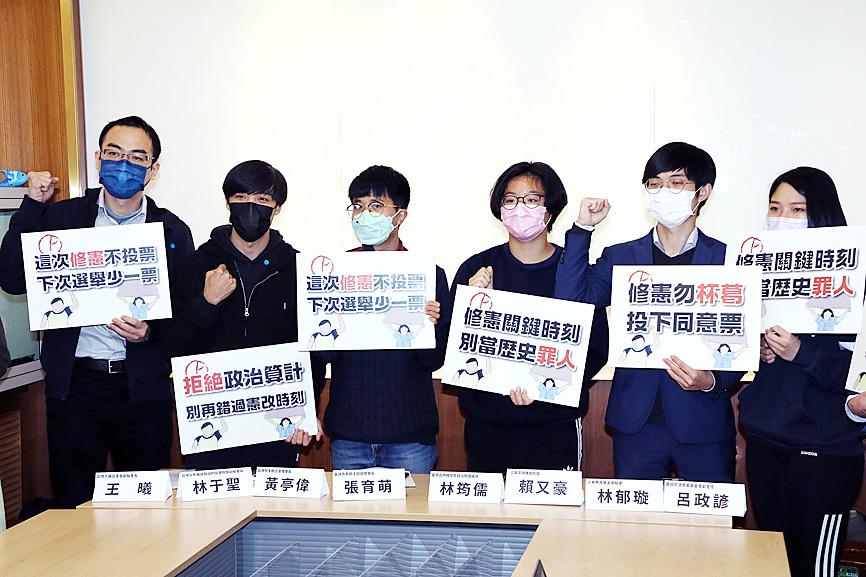Advocates yesterday called on lawmakers to lower the voting age to 18, a day after the Legislative Yuan’s Procedures Committee placed a related bill on the legislative agenda for tomorrow.
The bill — which would involve amending Article 1 of the Constitution — must pass the legislature by the end of this month if it is to be ratified in a referendum held concurrently with the local elections on Nov. 26.
Speaking at a news conference at the Legislative Yuan in Taipei, youth rights groups said that legislators must vote for the bill or be “condemned by history.”

Photo: CNA
Taiwan Youth Association for Democracy president Chang Yu-meng (張育萌) said that partisanship should not get in the way of enfranchising young people, a goal to which he said Taiwan has never been closer.
Japan, Malaysia and South Korea have amended their laws to lower the voting age, he said, adding that Taiwan must not become a holdout among the world’s democracies by denying young people the right to vote.
Lin Yu-sheng (林于聖), deputy secretary-general of the Taiwan Alliance for Advancement of Youth Rights and Welfare, said reducing the age threshold would help young people find their political voice and inject energy into political discussions.
Taiwan Association for Human Rights deputy secretary-general Wang Si (王曦) said that political parties must back the constitutional amendment as they have promised, adding that young people should at a minimum be able to establish civil groups and assemble as current laws implicitly allow.
Students from more than 100 high schools have joined the call to support the amendment on social media with the hashtag “votefor18,” and plan to demonstrate outside the Legislative Yuan as lawmakers vote on the bill, they said.
Lawmakers’ deliberations on the bill are to be broadcast live at the protest site, they added.

The Grand Hotel Taipei on Saturday confirmed that its information system had been illegally accessed and expressed its deepest apologies for the concern it has caused its customers, adding that the issue is being investigated by the Ministry of Justice Investigation Bureau. The hotel said that on Tuesday last week, it had discovered an external illegal intrusion into its information system. An initial digital forensic investigation confirmed that parts of the system had been accessed, it said, adding that the possibility that some customer data were stolen and leaked could not be ruled out. The actual scope and content of the affected data

‘LIKE-MINDED PARTNER’: Tako van Popta said it would be inappropriate to delay signing the deal with Taiwan because of China, adding he would promote the issue Canadian senators have stressed Taiwan’s importance for international trade and expressed enthusiasm for ensuring the Taiwan-Canada trade cooperation framework agreement is implemented this year. Representative to Canada Harry Tseng (曾厚仁) in an interview with the Central News Agency (CNA) said he was increasingly uneasy about Ottawa’s delays in signing the agreement, especially as Ottawa has warmed toward Beijing. There are “no negotiations left. Not only [is it] initialed, we have three versions of the text ready: English, French and Mandarin,” Tseng said. “That tells you how close we are to the final signature.” Tseng said that he hoped Canadian Prime Minister Mark Carney

POSITIVE DEVELOPMENT: Japan and the US are expected to hold in-depth discussions on Taiwan-related issues during the meeting next month, Japanese sources said The holding of a Japan-US leaders’ meeting ahead of US President Donald Trump’s visit to China is positive news for Taiwan, former Japan-Taiwan Exchange Association representative Hiroyasu Izumi said yesterday. After the Liberal Democratic Party’s landslide victory in Japan’s House of Representatives election, Japanese Prime Minister Sanae Takaichi is scheduled to visit the US next month, where she is to meet with Trump ahead of the US president’s planned visit to China from March 31 to April 2 for a meeting with Chinese President Xi Jinping (習近平). Japan and the US are expected to hold in-depth discussions on Taiwan-related issues during the

President William Lai (賴清德) yesterday bestowed one of Taiwan’s highest honors on Saint Vincent and the Grenadines (SVG) Ambassador Andrea Clare Bowman in recognition of her contributions to bilateral ties. “By conferring the Order of Brilliant Star with Grand Cordon on Ambassador Bowman today, I want to sincerely thank her, on behalf of the Taiwanese people, for her outstanding contribution to deepening diplomatic ties between Taiwan and SVG,” Lai said at a ceremony held at the Presidential Office in Taipei. He noted that Bowman became SVG’s first ambassador to Taiwan in 2019 and